Tribune News Service
Chandigarh, November 8
The State Ex-Servicemen Welfare Association (SEWA), Punjab, in its emergency meeting held today “out-rightly” rejected the notification on ‘one rank, one pension’ (OROP) formula issued by the central government on Saturday and decided to carry on its agitation.
Pointing out that the pension will be fixed for all pensioners on the basis of average of minimum and maximum pension drawn by the personnel retired during calendar year 2013 with the same rank and same number of years of service, Col Kuldip Singh Grewal (Retd), the association’s president said this had defied the very concept of OROP as accepted by Parliament during the tenure of two different governments.
He said leave aside other pensioners even those who retired in 2013 will get different pensions. Those who picked up the rank earlier with the same service will get more pension than those who picked up rank later. Under this clause most of the ex-servicemen will not get any benefit, he added.
Members of the association said personnel who opted to get discharge on their own request will not get any benefit of OROP. This clause will change the very structure of armed forces as the government wanted to keep the Army young. Consequent to implementation of this cause, soldiers will retire with full service and at much older age to get the future benefits of OROP.
Some ex-servicemen also contended that soldiers could resort to litigation as to why should they not be retired on a par with other government employees. As on today, retirees at early age have more chances of getting employment in the civilian sector and retiring at older ages would increase unemployment among them.
They added that the appointment of a judicial committee to look into anomalies would be of no use as representatives of stake holders are not a part of it and a lawman may not be familiar with military culture and intrinsic military matters.
All posts by webadmin
ਇੱਕ ਰੈਂਕ ਇੱਕ ਪੈਨਸ਼ਨ ਸਬੰਧੀ ਨੋਟੀਫਿਕੇਸ਼ਨ ਜਾਰੀ::::ਇੰਡੀਅਨ ਅੇੈਕਸ ਸਰਵਿਸਮੇੈਨ ਮੂਵਮੈਂਟ ਵੱਲੋਂ ਨੋਟੀਫਿਕੇਸ਼ਨ ਰੱਦ
ਨਵੀਂ ਦਿੱਲੀ, 7 ਨਵੰਬਰ
ਕੇਂਦਰ ਸਰਕਾਰ ਨੇ ਇੱਕ ਰੈਂਕ ਇੱਕ ਪੈਨਸ਼ਨ ਦੀ ਮੰਗ ਦੀ ਪੂਰਤੀ ਲੲੀ ਨੋਟੀਫਿਕੇਸ਼ਨ ਜਾਰੀ ਕਰ ਦਿੱਤਾ ਹੇੈ, ਜੋ ਅੱਜ ਰਾਤ ਤੋਂ ਲਾਗੂ ਹੋ ਗਿਆ ਹੈ। ਸਰਕਾਰ ਦੇ ਦਾਅਵਿਆਂ ਅਨੁਸਾਰ ਇਸ ਨਾਲ 25 ਲੱਖ ਤੋਂ ਵੱਧ ਸੈਨਿਕਾਂ ਅਤੇ ਮਰਹੁਮ ਜਾਂ ਸ਼ਹੀਦ ਸੈਨਿਕਾਂ ਦੀਅਾਂ ਪਤਨੀਅਾਂ ਨੂੰ ਲਾਭ ਮਿਲੇਗਾ। ਇਹ ਫੈਸਲਾ 1 ਜੁਲਾੲੀ 2014 ਤੋਂ ਲਾਗੂ ਹੋਵੇਗਾ। ਦੂਜੇ ਪਾਸੇ ਇੰਡੀਅਨ ਅੇੈਕਸ ਸਰਵਿਸਮੇੈਨ ਮੂਵਮੈਂਟ ਦੇ ਚੇਅਰਮੈਨ ਮੇਜਰ ਜਨਰਲ (ਸੇਵਾਮੁਕਤ) ਸਤਿਬੀਰ ਸਿੰਘ ਨੇ ਇਸ ਨੂੰ ਰੱਦ ਕਰ ਦਿੱਤਾ ਹੈ। ਨੋਟੀਫਿਕੇਸ਼ਨ ਅਨੁਸਾਰ ਸੇਵਾਮੁਕਤ ਫੌਜੀਆਂ ਨੂੰ 2013 ਵਿੱਚ ਸੇਵਾਮੁਕਤ ਹੋਏ ਫੌਜੀਆਂ ਨੂੰ ਆਧਾਰ ਮੰਨ ਕੇ ਪੈਨਸ਼ਨ ਨਿਰਧਾਰਤ ਕੀਤੀ ਜਾਵੇਗੀ। ਭਵਿੱਖ ਵਿੱਚ ਪੈਨਸ਼ਨ ਹਰ ਪੰਜ ਸਾਲਾਂ ਬਾਅਦ ਨਿਰਧਾਰਤ ਕੀਤੀ ਜਾਵੇਗੀ। ਸਵੈਇੱਛਾਂ ਨਾਲ ਪੈਨਸ਼ਨ ਲੈਣ ਵਾਲੇ ਫੌਜੀਆਂ ਨੂੰ ਇੱਕ ਰੇੈਂਕ ਇੱਕ ਪੈਨਸ਼ਨ ਦਾ ਲਾਭ ਨਹੀ ਮਿਲੇਗਾ। ਸਰਕਾਰ ਵੱਲੋਂ ਜਾਰੀ ਨੋਟੀਫਿਕੇਸ਼ਨ ਅਨੁਸਾਰ ਇੱਕ ਰੇੈਂਕ ਇੱਕ ਪੇੈਨਸ਼ਨ ਦਾ ਲਾਭ ਸਾਬਕਾ ਫੌਜੀਆਂ ਦੀਆਂ ਵਿਧਵਾਵਾਂ ਨੂੰ ਵੀ ਮਿਲੇਗਾ। ਸਰਕਾਰ ਵੱਲੋਂ ਨਵੇਂ ਪੈਨਸ਼ਨ ਫਾਰਮੂਲੇ ਤਹਿਤ ਸਾਲ 2013 ਵਿੱਚ ਮਿਲਦੀ ਪੈਨਸ਼ਨ ਦੀ ਅੌਸਤ ਕੱਢਕੇ ਨਵਾਂ ਫਾਰਮੂਲਾ ਤਿਆਰ ਕੀਤਾ ਜਾਵੇਗਾ। ਰੱਖਿਆ ਮੰਤਰਾਲੇ ਦੇ ਬੁਲਾਰੇ ਸਿਤਾਂਸ਼ੂਕਾਰ ਨੇ ਟਵੀਟ ਕੀਤਾ ਹੈ ਕਿ ਨੋਟੀਫਿਕੇਸ਼ਨ ਨੂੰ ਹਾਂਪੱਖੀ ਤਰੀਕੇ ਨਾਲ ਲਾਗੂ ਕੀਤਾ ਜਾਵੇਗਾ।
ਦੌਜੇ ਪਾਸੇ ਸਾਬਕਾ ਫੌਜੀਆਂ ਨੇ ਇਸ ਨੋਟੀਫਿਕੇਸ਼ਨ ਨੂੰ ਰੱਦ ਕਰਦਿਆਂ ਕਿਹਾ ਹੈ ਕਿ ਪੈਨਸ਼ਨ ਦਾ ਆਧਾਰ ਕੈਲੰਡਰ ਸਾਲ 2013 ਦੀ ਥਾਂ ਵਿਤੀ ਸਾਲ 2013 ਚਾਹੀਦਾ ਹੈ। ੳੁਨ੍ਹਾਂ ਕਿਹਾ ਕਿ ਇਹ ਇੱਕ ਰੈਂਕ ਇੱਕ ਪੈਨਸ਼ਨ ਦੀ ਥਾਂ ਇੱਕ ਰੈਂਕ ਪੰਜ ਪੈਨਸ਼ਨਾਂ ਹੋ ਗਿਆ ਹੈ। ਇਸ ਤੋਂ ਇਲਾਵਾ ੳੁਹ ਇਸ ਇੱਕ ਜੁਲਾੲੀ ਤੋਂ ਲਾਗੂ ਕਰਨ ਦੀ ਥਾਂ ਇੱਕ ਅਪਰੈਲ ਤੋਂ ਲਾਗੂ ਕਰਵਾੳੁਣਾ ਚਾਹੁੰਦੇ ਹਨ।
-ਪੀਟੀਆੲੀ
3rd Military Literature Festival to kick off in city on Dec 13
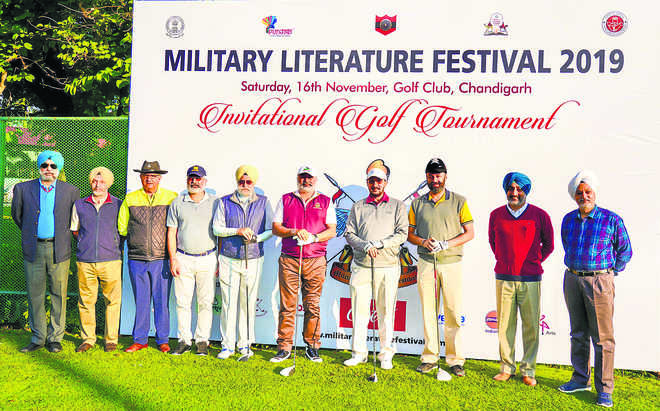
Participants get ready for the Invitational Golf Tournament, a precursor to the 3rd Military Literature Festival, in Chandigarh on Saturday. tribune photo
Chandigarh, November 16
The sprawling greens of Chandigarh Golf Club came alive today with stories of exemplary valour and sacrifices made by the bravehearts of Indian defence forces in their line of service for the motherland.
More than 175 distinguished war veterans of the three armed forces, besides officers from civil services, descended in Chandigarh to participate in the Invitational Golf Tournament, organised as precursor to the 3rd Military Literature Festival (MLF) to be held here from December 13 till 15.
The MLF is the joint initiative spearheaded by the Punjab Government, led by Chief Minister Capt Amarinder Singh, and the Chandigarh Administration led by VP Singh Badnore, in collaboration with the Army.
The specially curated golf tourney was amongst the scintillating array of competitions and activities being organised to build up momentum prior to the gala event next month. Decorated battle hardened veterans from across the country had been invited to tee off together and share stories of camaraderie and hardships endured during service years, besides tales of heroic deeds spanning over their professional careers.
Earlier, Special Principal Secretary to Punjab CM Gurkirat Kirpal Singh, along with the Chief of Staff Western Command Lt Gen Gurpal Singh Sangha, inaugurated the event with ribbon cutting before teeing off. — TNS
Pakistan Is DNA Of Terrorism’: India’s Reply On Kashmir At UNESCO
The Indian representative noted that Pakistan, in 2018, ranked 14th on the fragile state index.

India on Thursday gave a reply to Pakistan over Jammu and Kashmir, saying the cash-strapped nation itself is “a DNA of terrorism”.
“Pakistan’s neurotic behaviour has resulted in its decline to a nearly failed state with its weak economy, radicalised society and deep-rooted DNA of terrorism,” said Ananya Agarwal, who led the Indian delegation to the UNESCO General Conference being held in Paris.
“We condemn Pakistan’s disappointing misuse of UNESCO to spew venom against India and politicise it,” she added.
Agarwal noted that Pakistan, in 2018, ranked 14th on the fragile state index.
Pakistan is home to all shades of darkness; from extremist ideologies and darker powers of radicalisation to the darkest manifestations of terrorism, she told the panel.
Agarwal further said that Pakistan is a country, whose leader uses the UN platform to openly preach nuclear war and issue a call to use arms against other nations, referring to Prime Minister Imran Khan’s remarks at the UN General Assembly session in September whereby the leader had warned India that if there’s face-off between two nuclear-armed neighbours, the consequences would be far beyond their borders.
“Would this gathering believe if I told them that one of Pakistan’s former president’s Gen. Pervez Musharraf recently called terrorists such as Osama Bin laden and Haqqani network as Pakistan’s heroes,” she questioned the panel.
Agarwal stated that Pakistan has been engaging into such “diabolic rhetoric” to malign India in front of the international community irrespective of the deplorable conditions of human rights suffered by the minority community on its own soil.
“From 1947, when the minorities formed 23 per cent of Pakistan’s population they have now dwindled to make nearly 3 per cent. It has subjected Christians, Sikhs, Ahmadiyya, Hindus, Shias, Pashtuns, Sindhis and Balochis to draconian blasphemy laws, blatant abuse and forced conversions. The gender-based crimes against women include including honour killings, acid attacks forced conversions, forced marriages and child marriages remain a severe problem in Pakistan today,” she said.
Agarwal said that India strongly rejects the fabricated falsehoods peddled by Pakistan in its statement overflowing with hypocrisy to hide its own pathetic and pitiable records as a nation including its own treatment of minorities, the spread of hate speech and glorification of terrorism.
In her concluding remarks, the panellist hoped that the UNESCO membership would come together to reject such a gross misuse of the platform by any member nation.
Navy’s woman officer to be posted abroad as defence attache
NEW DELHI: The Navy has now also selected its first woman of ..
Corridor revives hope for Lahore bus SGPC volunteers to facilitate devotees in furnishing travel documents
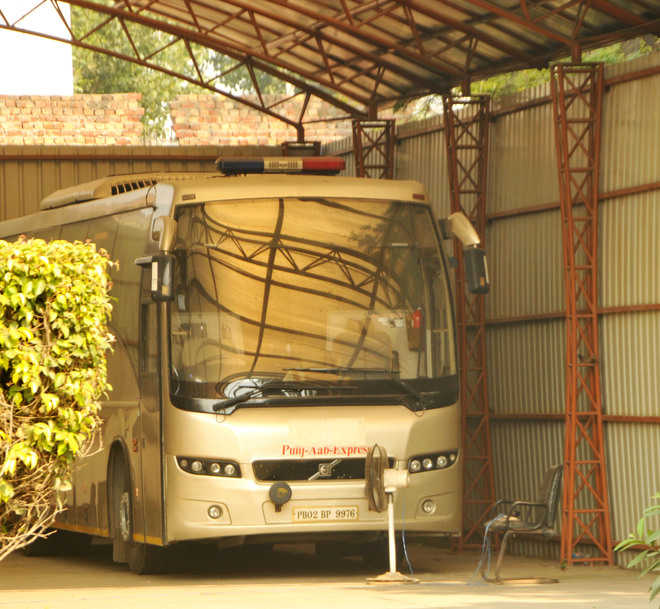
A Punj-Aab bus at the international bus terminus in Amritsar.
GS Paul
Tribune News Service
Amritsar, November 10
The Kartarpur corridor opening has infused a ray of hope among the Sikhs for the revival of “Punj-Aab” bus service between Amritsar-Lahore-Nankana Sahib, the birth place of Guru Nanak.
The SGPC has offered to act as a conduit to facilitate the pilgrims for furnishing the travel documentation formalities and obtaining visa. At present, it is being furnished at the New Delhi embassy.
However, political experts believe that the India-Pakistan bus or rail services are unlikely to resume in near future till political will on either side of the border was there. SGPC chief secretary Roop Singh said, “This service was the most convenient to connect the two holy cities — Amritsar and Nankana Sahib. If the SGPC is entrusted with the responsibility of furnishing the visa formalities of the devotees, we will do the service. Devotees can deposit their passports, bus fare and visa fee with us and we can depute our staff to get their travel formalities endorsed from the embassies concerned in New Delhi.”
As a fall out of India’s move to revoke Article 370 in J&K, Pakistan had snapped all cross-border rail and road links besides downgrading diplomatic relations.
On August 10, the bus service on the Amritsar-Lahore-Nankana Sahib route was suspended. Since then, the bus has been stationed at the International Bus Terminus, Amritsar. Consequently, the incharge, two drivers and administrative staff have been sitting idle. Interestingly, around 14-15 police officers have been performing their duty to safeguard the stationary bus on rotational basis. They all earnestly desire that this bus, which has the exclusive permit of Amritsar-Nankana Sahib via Lahore, should run as it provided the passengers of both the nations an opportunity to meet their relatives who have been separated since Partition.
Harpal Singh Bhullar of Bhai Mardana Society, which organises pilgrimage to Pakistan on Gurpurbs, said the visa formalities should also be made locally in Amritsar. “It is a pity that the clause of the police verification of passengers is implemented on this route only, whereas there was no such binding for those who travelled on the New Delhi-Lahore route,” he added.
Notably, the Amritsar-Nankana Sahib bus service, started on March 24, 2006, was flagged off by the then PM Manmohan Singh. Earlier, 25-30 passengers used to travel in the bus, but the count dipped in the last few months.
Big moment, ties to improve enormously: Ex-PM Manmohan Singh, Capt Amarinder, Sukhbir part of first jatha to visit Kartarpur
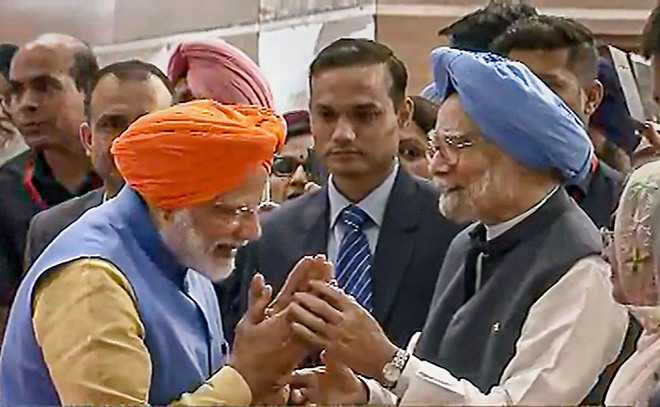
Prime Minister Narendra Modi greets former PM Manmohan Singh at Dera Baba Nanak on Saturday. PTI
Kartarpur (Pak), November 9
The opening of the Kartarpur corridor will “enormously improve” relations between India and Pakistan, former Prime Minister Manmohan Singh said on Saturday after he arrived here as part of the first batch of the Indian pilgrims through the cross-border pathway.
Speaking to reporters, the former PM termed the opening of the corridor a “big moment”. “India and Pakistan relations will improve enormously as a result of this beginning,” he said.
The 87-year-old two-time Prime Minister and his wife paid obeisance at Gurdwara Darbar Sahib. Pakistan PM Imran Khan formally inaugurated the historic corridor to facilitate the visa-free entry of Indian Sikh pilgrims.
He welcomed the first batch of the Indian Sikh pilgrims who entered Pakistan through the corridor which links Gurdwara Darbar Sahib in Pakistan, the final resting place of Guru Nanak Dev, to Dera Baba Nanak shrine in Punjab’s Gurdaspur. Manmohan Singh arrived here as part of the first batch, which also included Akal Takht Jathedar Harpreet Singh, Punjab Chief Minister Capt Amarinder Singh, former CM Parkash Singh Badal, Sukhbir Singh Badal, Harsimrat Kaur Badal, cricketer-turned-politician Navjot Singh Sidhu and BJP MP Sunny Deol.
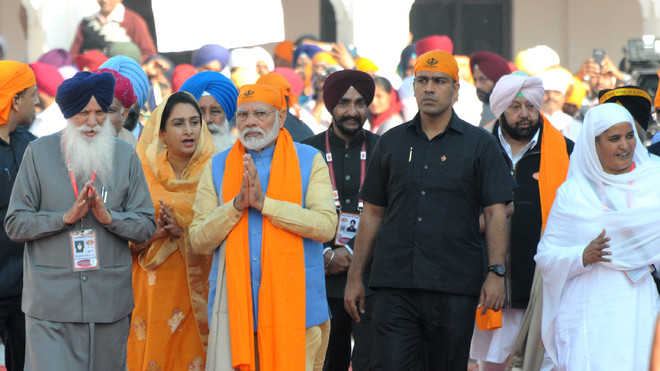
Prime Minister Narendra Modi along with Punjab Chief Minister Capt Amarinder Singh and Union Minister Harsimrat Kaur Badal at Gurdwara Ber Sahib in Sultanpur Lodhi on Saturday. Photo Malkiat Singh
Capt Amarinder said the Sikh community had been waiting for a free passage for 70 years and maintained that it was a good beginning.
SGPC members and all MLAs and MPs from Punjab, including ministers, were also part of the first jatha. Earlier, Prime Minister Narendra Modi flagged off the first batch of over 500 pilgrims, saying it would be easy to pay obeisance at Gurdwara Darbar Sahib after the opening of the corridor.
Asserting that he was fortunate to be able to dedicate the corridor to the country, Modi said the opening of the corridor and the integrated check post would bring double happiness to the people.
According to the agreement between Pakistan and India, 5,000 pilgrims from India can visit the shrine daily and the number can be increased in future.
The requirement of passport and the $20 service fee have been waived for Saturday and for November 12 by Pakistan. Separate events have been organised on both sides of the border to launch the much-awaited corridor ahead of Guru Nanak’s 550th birth anniversary on November 12. Guru Nanak spent last 18 years of his life at Kartarpur Sahib, which has now become the world’s largest gurdwara. — PTI
t was a spiritual and emotional moment. There was an atmosphere of spirituality and religiosity. —Manish Tewari, Anandpur Sahib MP
Rohtang Pass gets fresh snow; Manali-Leh highway blocked
Dipender Manta
Tribune News Service
Mandi, November 7
Rohtang Pass and its nearby places at Gulaba and Solang valley in Kullu district received fresh snowfall on Thursday morning, something that delighted the tourists and the locals who thronged Solang in large numbers.
The entire area has been covered with white blanket of snow, plummeting the temperature drastically in the region.
The traffic movement has been suspended between Manali and Keylong on the Manali-Leh highway via Rohtang Pass, which received 15 cm snow.
The snowfall was still continuing, said some residents of Manali. The lower parts of Kullu and Mandi districts received rain. In Lahaul and Spiti too, fresh snowfall was reported in higher reaches.
From midnight, J-K will cease to be a state; 2 new UTs to come into being
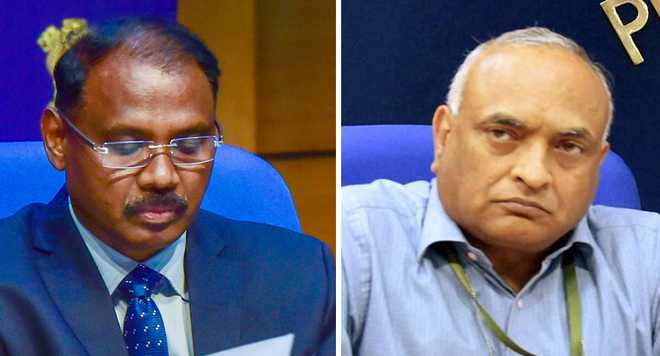
GC Murmu (left) and RK Mathur will be sworn in as new LGs for UTs of Jammu and Kashmir, and Ladakh, respectively. — File photos
New Delhi, October 30
History will be created on Thursday when Jammu and Kashmir, which has been part of the Union of India since 1947, will cease to be a state and will be bifurcated into two Union Territories.
IAS officers Girish Chandra Murmu and R K Mathur, who have been appointed the new Lieutenant-Governors (LG) for the Union territories (UTs) of Jammu and Kashmir, and Ladakh, respectively, will be sworn-in at separate functions to be held in Srinagar and Leh on Thursday.
Both Murmu and Mathur will be sworn in by Chief Justice of J&K High Court Gita Mittal.
According to the Jammu and Kashmir Reorganisation Act, 2019, the appointed day for the two UTs is October 31 and these will come into existence in the midnight (Wednesday-Thursday), nearly three months after the announcement in Rajya Sabha.
This is for the first time that a state is converted into two UTs even though there are numerous example of a UT becoming a full state or a state bifurcating into two states.
Also read: Umang Narula made advisor to Ladakh’s Lt Governor, SS Khandare appointed police head
The total number of states in the country will be now 28 while the total UTs will go up to seven.
The Narendra Modi government’s decision and subsequent approval of Parliament to abrogate the special status given to Jammu and Kashmir under Article 370 and its bifurcation into two UTs was taken to redraw the map and future of a region at the centre of a protracted militancy movement.
The electoral promise of the BJP to end the special status of Jammu and Kashmir came less than 90 days after the Modi 2.0 government assumed power in May end.
The August 5 decision was taken 72 years after the then ruler of the princely state, Maharaja Hari Singh, executed the Instrument of Accession on October 26, 1947, making it part of the Union of India.
The two UTs will come into existence on the day of the birth anniversary country’s first Home Minister Sardar Vallabhbhai Patel, who is credited for merger of over 560 states into the Union of India.
October 31 is observed as the National Unity Day and both Modi and Home Minister Amit Shah on Thursday will attend separate functions—in Kevadia (Gujarat) and New Delhi, respectively.
According to the Act, the UT of Jammu and Kashmir will have a legislature like Puducherry while Ladakh will be a UT without legislature like Chandigarh and both the UTs will be headed by two separate Lieutenant-Governors (LG).
The Centre will be in direct control of the police and the law and order in Jammu and Kashmir from Thursday when it becomes a UT, while the land will be under the elected government there.
The UT of Ladakh will be under the direct control of the central government which will administer the high altitude region through the LG.
While moving the resolution in the Rajya Sabha that Article 370 — which allowed Jammu and Kashmir to have its own Constitution and prohibited outsiders from buying land and property in the state, Shah had said these provisions will no longer be applicable and the central government will restore its statehood at “appropriate time” and after “normalcy” returns.
“The government will not allow the situation to turn into another battle torn Kosovo… It was heaven on earth and will remain so,” Shah had said, referring to the decades-old militancy in Jammu and Kashmir.
Soon after the abrogation of the Article 370, several hundred political leaders and separatists were put under detention by the Jammu and Kashmir administration while restrictions were also imposed on movement of people, vehicles, telephone, mobile phones and internet.
While most of the restrictions were removed since then, curb on internet is still continuing and situation in the Kashmir Valley is yet to be termed as complete normal.
Among those put under detention include three former chief ministers—Farooq Abdullah, Omar Abdullah and Mehbooba Mufti.
The Jammu and Kashmir Reorganisation Act, 2019 says the all India Services like the Indian Administrative Service (IAS) and the Indian Police Service (IPS), of J-K cadre will continue to serve in the two succeeding UTs while new recruits of these services will be allocated in the Arunachal, Goa, Mizoram Union Territory (AGMUT) cadre.
The provincial service officers will continue serving in their current positions till a new order is issued by the Lt Governors for the two new UTs of Jammu and Kashmir and Ladakh.
The IAS, IPS and other central service officers and the Anti-Corruption Bureau (ACB) will be under the control of the LG and not the elected government of the UT of Jammu and Kashmir.
Mehbooba was the last chief minister of undivided Jammu and Kashmir whose tenure ended in June 2017 when central rule was imposed there after her coalition partner BJP withdrew support. Satya Pal Malik is the last governor whose tenure comes to an end on Wednesday. He has been transferred and appointed as Governor of Goa.
Just a day before Jammu and Kashmir is divided into two UTs, the National Conference on Wednesday made a fervent last minute appeal to the Centre to shelve the plan and maintain the statehood of the “200-year-old state” dubbed as “crown of India”. — PTI
Only a retreat can save face for Pakistani establishment
On Monday night, former prime minister Nawaz Sharif was moved to a hospital after his personal physician Dr Adnan Khan tweeted that Sharif’s platelet count was extremely low. After the news appeared, Pakistan Muslim League-Nawaz (PML-N) workers gathered in front of the National Accountability Bureau (NAB) office and chanted slogans against the government and its backers. This must be an alarming situation for the ruling elite, as the anger against Imran Khan and the establishment is reaching a boiling point.
Sharif was always going to prove more dangerous from behind bars, as if anything were to happen to him, the backlash from the province of Punjab would be beyond the control of even the mightiest security establishment. While the media attention was focused on Sharif, the government arrested his son-in-law, retired Captain Muhammad Safdar Awan, while he was coming to see Sharif in the hospital.
Now with each and every step of crushing opposition, the PTI regime is only moving faster toward the end. The co-chairman of the Pakistan Peoples Party (PPP), Asif Zardari, is also being denied the fundamental right of access to medical treatment despite being a heart patient with diabetes. This shows the lack of political acumen of Khan and his party, as a government with just a little understanding of the nature of politics would know that it takes only one event to trigger a mass movement against any regime, and the throne given by the invisible forces can be taken back at any time.
Imran Khan’s weak government is surviving only on the ventilator provided by the establishment, and it remains to be seen whether the latter will use Khan’s ouster as a bargaining chip to make sure the current top military brass remains at the helm of affairs or it will go to any extent to preserve the status quo. On the other hand, there are questions over the political strategy adopted by the current PML-N leadership, which somehow is roaming freely despite the massive crackdown against the party.
As long as Maryam Nawaz was at the helm of party affairs it was evident that the PML-N was giving a tough time to the establishment and the PTI government, but after her arrest the lackluster party leadership is only conducting traditional status quo politics and seems ready to replace Khan with another puppet.
So the question remains, who will bail out the establishment at a time when it is written on the wall that sooner or later it will suffer its first-ever defeat in the political history of the country?
Sharif has risked everything to turn the tables and so has his daughter Maryam, who is being kept in solitary confinement for a crime that has not yet been proved in any court of law. So the question remains, who will bail out the establishment at a time when it is written on the wall that sooner or later it will suffer its first-ever defeat in the political history of the country? Sharif may be suffering from health problems, but his resolve is commendable, and with massive support from the province of Punjab, it is impossible for him to bail the establishment out of the current situation.
Meanwhile the PPP, after being cheated on many occasions by the powers that be, also seems less interested in providing any relief to the establishment. Perhaps this is the reason many of the leaders of the PPP are also behind bars.
So both the PML-N and PPP seem ready to pay the price of their resistance against the PTI and its backers. The religious card, which once was used by the establishment to weaken elected governments, is now going to be used against the establishment and the current government by the Jamiat Ulema-e Islam (F) of Fazal-ur-Rehman.
As well, the sword of the Financial Action Task Force is still hanging over Pakistan’s neck as the country is being kept on the gray list, and the FATF will again review Pakistan’s performance in February. The Kashmir fiasco and the regular fights with India at the Line of Control are also problems, as with the economy in shambles the country cannot afford to have tension on the borders with India. So it is a dead-end street from which the establishment can only escape if it is ready to make a retreat on the power chessboard.
Sharif’s narrative of “respect the vote” has snatched the sacred-cow status away from the establishment in Punjab, which once was a traditional pro-establishment province. Little did the invisible forces know that while rigging the political discourse they actually were not ousting Sharif from Punjab but were ousting themselves from the power chessboard.
It is in the best interests of the country that the establishment take a back seat and let the Election Commission of Pakistan hold fair and free fresh elections. A face-saving exit is what the establishment should look for. It needs to understand that it is not the state itself but only an organ of the state, and neither is it invincible nor is it above the constitution of the country. It also needs to get out of the illusion that it is the sole institution that is vital for the survival of the country.
A teacher who is providing education in a far-flung village in Balochistan, a doctor working around the clock to save lives, a policeman dying while trying to stop terrorists or an electrician trying to fix the electricity for the cities; a judge upholding the constitutions, a lawyer fighting to get justice for a fellow citizen – every one in his or her own capacity is making sacrifices for the betterment of the country, while journalists or politicians are accused of treason for criticizing the flaws in government services.
It is the constitution that is supreme, and it clearly states that the military establishment has no right to intervene in politics or in shaping the ideological narratives of the country. Even the short history of the country testifies that the establishment’s interventions have only weakened democracy and brought self-inflicted economic and political turmoil to the country. It is the time that the invisible forces make a face-saving exit and let the elected representatives run the affairs of the state. Otherwise, the damage to the economy and the political and social fabrics will become beyond repair.























































